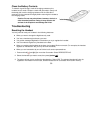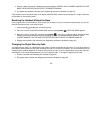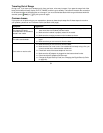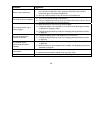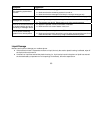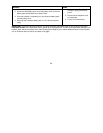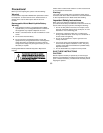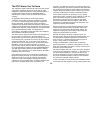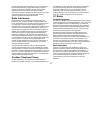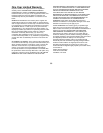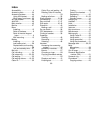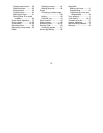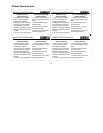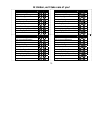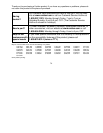67
produce depending on their intended usage. This product has
been tested and found to comply with the FCC’s exposure
criteria. For body worn operation, the FCC RF exposure
guidelines were also met when used with the Uniden
accessories supplied or designed for this product. Use of other
accessories may not ensure compliance with FCC RF
exposure guidelines and should be avoided.
Radio Interference
Radio interference may occasionally cause buzzing and
humming in your cordless handset, or clicking noises in the
base. This interference is caused by external sources such as
TV, refrigerator, vacuum cleaner, fluorescent lighting, or
electrical storm. Your unit is NOT DEFECTIVE. If these noises
continue and are too distracting, please check around your
home to see what appliances may be causing the problem. In
addition, we recommend that the base not be plugged into a
circuit that also powers a major appliance because of the
potential for interference. Be certain that the antenna on the
unit is fully extended when needed. In the unlikely event that
you consistently hear other voices or distracting transmissions
on your phone, you may be receiving radio signals from
another cordless telephone or other source of interference. If
you cannot eliminate this type of interference, you need to
change to a different channel.
Finally, it should be noted that some cordless telephones
operate at frequencies that may cause interference to nearby
TVs and VCRs. To minimize or prevent such interference, the
base of the cordless telephone should not be placed near or on
top of a TV or VCR. If interference is experienced, moving the
cordless telephone farther away from the TV or VCR will often
reduce or eliminate the interference.
Cordless Telephone Privacy
Cordless telephones are radio devices. Communications
between the handset and base of your cordless telephone are
accomplished by means of radio waves which are broadcast
over the open airways. Because of the inherent physical
properties of radio waves, your communications can be
received by radio receiving devices other than your own
cordless telephone unit. Consequently, any communications
using your cordless telephone may not be private.
I.C. Notice
Terminal Equipment
NOTICE:This equipment meets the applicable Industry Canada
Terminal Equipment Technical Specifications. This is confirmed
by the registration number. The abbreviation, IC, before the
registration number signifies that registration was performed
based on a Declaration of Conformity indicating that Industry
Canada technical specifications were met. It does not imply
that Industry Canada approved the equipment.
NOTICE:The Ringer Equivalence Number (REN) for this
terminal equipment is marked on the equipment itself. The
REN assigned to each terminal equipment provides an
indication of the maximum number of terminals allowed to be
connected to a telephone interface. The termination on an
interface may consist of any combination of devices subject
only to the requirement that the sum of the Ringer Equivalence
Numbers of all the devices does not exceed five.
Radio Equipment
The term "IC:" before the radio certification number only
signifies that Industry Canada technical specifications were
met. Operation is subject to the following two conditions: (1)
this device may not cause interference, and (2) this device
must accept any interference, including interference that may
cause undesired operation of the device. "Privacy of
communications may not be ensured when using this
telephone".



